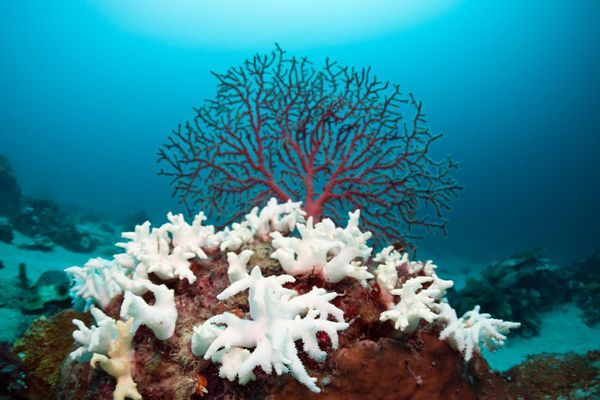
The Chagos Archipelago is one of the most remote places on Earth. Smack dab in the middle of the Indian Ocean, the collection of more than five dozen tiny islands are mostly uninhabited, due in no small part to the United States and United Kingdom expelling the Indigenous Chagossians in an ethnic cleansing from 1967 to 1973. For decades only a single atoll, Diego Garcia, has had any inhabitants. Yet as coral reef ecologist Alexandra Dempsey explored the atolls’ beautiful coral reefs in 2015, she nevertheless found signs of human pollution.
“While we were there, we witnessed the very first stages of a bleaching event,” Dempsey said, referring to when coral becomes dead and white due to stress. Dempsey recalled "the scale at which these 100-year-old corals were just stressed. They were paling. The cotton candy colors paling is definitely an indicator of an ecosystem that is extremely stressed.”
Even the supposed “crown jewel of the reefs” looked bleached because of temperatures upwards of 80 and 90 degrees Fahrenheit. As CEO of the Khaled bin Sultan Living Oceans Foundation, Dempsey often thinks about how to protect coral reefs from human activity, yet is now presented with evidence that even the most remote locations cannot be entirely protected.
One big reason? Few things, if anything, will be unaffected by global heating.
“No matter how much protection and how much due diligence goes behind trying to keep humans and people away from the reefs, the effects of climate change are just absolutely devastating to these ecosystems,” Dempsey said.

Marine fisheries ecologist Khatija Alliji, from the Centre for Environment, Fisheries and Aquaculture Science, has personally seen humans tampering with coral reefs while exploring them, and from that observation points out that it is not merely our greenhouse gas emissions that harm coral reefs and underwater ecosystems.
“Currently coral reefs face many threats, including (but not limited to) biodiversity loss, water quality, climate change, disease, predation, coastal development, litter, marine traffic and pollution,” Alliji explained. Because reefs are so complex, scientists still do not fully understand all the interlocking parts that make them work. Even the recent Red List assessment that found over two-fifths of coral reef species threatened with extinction added there are some species where data is so deficient that a risk category cannot be assigned.
“Advancements in coral taxonomy using DNA has led to the discovery of new species of coral and better taxonomic definition,” Alliji said. “But there is still lots to investigate and this is both exciting and terrifying given the many threats listed above.”
For all of the mysteries that remain about coral reefs, though, experts agree that climate change is an undisputed threat. Indeed, our planet is already in the middle of its fourth global coral bleaching event in 18 months largely due to climate change, which experts predict will worsen as we surpass 1.5º C of global temperature rise.
“Locally, some reef regions surpassed 1.5º C in the last year, but it takes a global average over 20 years to calculate the threshold; it is highly likely temperature levels will exceed even 2º C globally before a turning point is reached,” David Obura, chair of the Intergovernmental Platform on Biodiversity and Ecosystem Services, told Salon. “Scientists recently shifted the estimated critical range for corals from 1.5º to 2º C warming to [between] 1º and 1.5º C warming. And as with many things with climate change and the Anthropocene, severe and compounding impacts are being observed earlier than predicted.”
Aldo Croquer, a marine conservation program manager for the Central Caribbean in Nature Conservancy, said that coral reefs have weathered many cataclysmic events in Earth’s history, but they may not survive humanity.
“Corals have evolved facing great challenges and they have managed to survive, even to massive global extinctions,” Croquer said. “Their capacity to adapt to environmental change and to come back from disturbances is indisputable, at least at evolutionary time scales. However, the changes that we are seeing today occurred at the scales of decades. This is unprecedented. Thus, we are clearly challenging coral’s natural capacity for adaptation.”
To protect coral reefs from rising temperatures and other human activity, it is critical for local communities to work together with global authorities so they can salvage what they can.
“Climate change is a global issue and will need both local and global management and solutions to ensure we protect our natural ecosystems and resources,” Alliji said. “The ocean has no boundaries and therefore a collaborative approach is required to ensure coral survival and guarantee their future.”
Obura added, “There is a localized commitment to enabling the sorts of changes that can reduce local pressures, which revolve around promoting circular economies, less destructive economic and development practices. To some extent the problem is these are pitched as ‘local’ problems for local authorities to act on, but often the broader national and international contexts don’t facilitate this by continually incentivising more growth, more resorts, more fishing, more goods and services, etc.”
Yet even if all of the necessary changes are made, scientists like Jason Spadaro from the Coral Reef Restoration Research Program in Florida's Mote Marine Laboratory still expect more depressing journeys like one he recently took to the Florida Keys.
“When I started my career back in 2006 or so, coral reefs in the Florida Keys in particular had about maybe a little better than 10% of their surface covered in live coral,” Spadaro said. “Today we've got somewhere less than 2%, as well as a fourfold decrease in the living tissue color cover of our coral reefs in the Keys. That's due almost entirely to things like climate change.”







